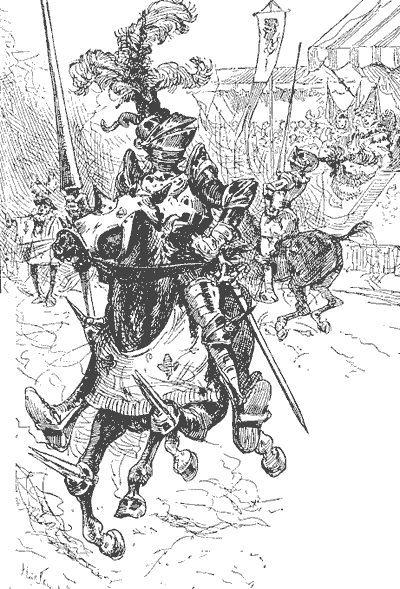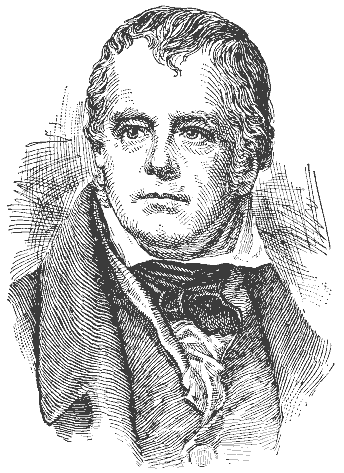

 Then
comes Sir Walter Scott with his enchantments, and by his single might checks
this wave of progress, and even turns it back; sets the world in love with
dreams and phantoms; with decayed and swinish forms of religion; with decayed
and degraded systems of government; with the sillinesses and emptinesses,
sham grandeurs, sham gauds, and sham chivalries of a brainless and worthless
long-vanished society. He did measureless harm; more real and lasting harm,
perhaps, than any other individual that ever wrote. Most of the world has
now outlived good part of these harms, though by no means all of them; but
in our South they flourish pretty forcefully still. Not so forcefully as
half a generation ago, perhaps, but still forcefully. There, the genuine
and wholesome civilization of the nineteenth century is curiously confused
and commingled with the Walter Scott Middle-Age sham civilization; and so
you have practical, common-sense, progressive ideas, and progressive works;
mixed up with the duel, the inflated speech, and the jejune romanticism
of an absurd past that is dead, and out of charity ought to be buried. But
for the Sir Walter disease, the character of the Southerner-- or Southron,
according to Sir Walter`s starchier way of phrasing it-- would be wholly
modern, in place of modern and medieval mixed, and the South would be fully
a generation further advanced than it is. It was Sir Walter that made every
gentleman in the South a Major or a Colonel, or a General or a Judge, before
the war; and it was he, also, that made these gentlemen value these bogus
decorations. For it was he that created rank and caste down there, and also
reverence for rank and caste, and pride and pleasure in them. Enough is
laid on slavery, without fathering upon it these creations and contributions
of Sir Walter. Then
comes Sir Walter Scott with his enchantments, and by his single might checks
this wave of progress, and even turns it back; sets the world in love with
dreams and phantoms; with decayed and swinish forms of religion; with decayed
and degraded systems of government; with the sillinesses and emptinesses,
sham grandeurs, sham gauds, and sham chivalries of a brainless and worthless
long-vanished society. He did measureless harm; more real and lasting harm,
perhaps, than any other individual that ever wrote. Most of the world has
now outlived good part of these harms, though by no means all of them; but
in our South they flourish pretty forcefully still. Not so forcefully as
half a generation ago, perhaps, but still forcefully. There, the genuine
and wholesome civilization of the nineteenth century is curiously confused
and commingled with the Walter Scott Middle-Age sham civilization; and so
you have practical, common-sense, progressive ideas, and progressive works;
mixed up with the duel, the inflated speech, and the jejune romanticism
of an absurd past that is dead, and out of charity ought to be buried. But
for the Sir Walter disease, the character of the Southerner-- or Southron,
according to Sir Walter`s starchier way of phrasing it-- would be wholly
modern, in place of modern and medieval mixed, and the South would be fully
a generation further advanced than it is. It was Sir Walter that made every
gentleman in the South a Major or a Colonel, or a General or a Judge, before
the war; and it was he, also, that made these gentlemen value these bogus
decorations. For it was he that created rank and caste down there, and also
reverence for rank and caste, and pride and pleasure in them. Enough is
laid on slavery, without fathering upon it these creations and contributions
of Sir Walter.
Sir Walter had so large a hand in making Southern character, as it existed before the war, that he is in great measure responsible for the war. It seems a little harsh toward a dead man to say that we never should have had any war but for Sir Walter; and yet something of a plausible argument might, perhaps, be made in support of that wild proposition. The Southerner of the American Revolution owned slaves; so did the Southerner of the Civil War: but the former resembles the latter as an Englishman resembles a Frenchman. The change of character can be traced rather more easily to Sir Walter`s influence than to that of any other thing or person. One may observe, by one or two signs, how deeply that influence penetrated, and how strongly it holds. If one take up a Northern or Southern literary periodical of forty or fifty years ago, he will find it filled with wordy, windy, flowery `eloquence,` romanticism, sentimentality-- all imitated from Sir Walter, and sufficiently badly done, too-- innocent travesties of his style and methods, in fact. This sort of literature being the fashion in both sections of the country, there was opportunity for the fairest competition; and as a consequence, the South was able to show as many well-known literary names, proportioned to population, as the North could. But a change has come, and there is no opportunity now for a fair competition
between North and South. For the North has thrown out that old inflated
style, whereas the Southern writer still clings to it--clings to it and
has a restricted market for his wares, as a consequence. There is as much
literary talent in the South, now, as ever there was, of course; but its
work can gain but slight currency under present conditions; the authors
write for the past, not the present; they use obsolete forms, and a dead
language. But when a Southerner of genius writes modern English, his book
goes upon crutches no longer, but upon wings; and they carry it swiftly
all about America and England, and through the great English reprint publishing
houses of Germany-- as witness the experience of Mr. Cable and Uncle Remus,
two of the very few Southern authors who do not write in the Southern
style. Instead of three or four widely-known literary names, the South
ought to have a dozen or two--and will have them when Sir Walter`s time
is out. |
| You've got to be one of two ages to appreciate
Scott. When you're eighteen you can read Ivanhoe, and you want to
wait until you are ninety to read some of the rest. It takes a pretty well-regulated,
abstemious critic to live ninety years. - "The Disappearance of Literature Speech," November 20, 1900 |
 Sir Walter Scott |
Quotations | Newspaper Articles | Special Features | Links | Search